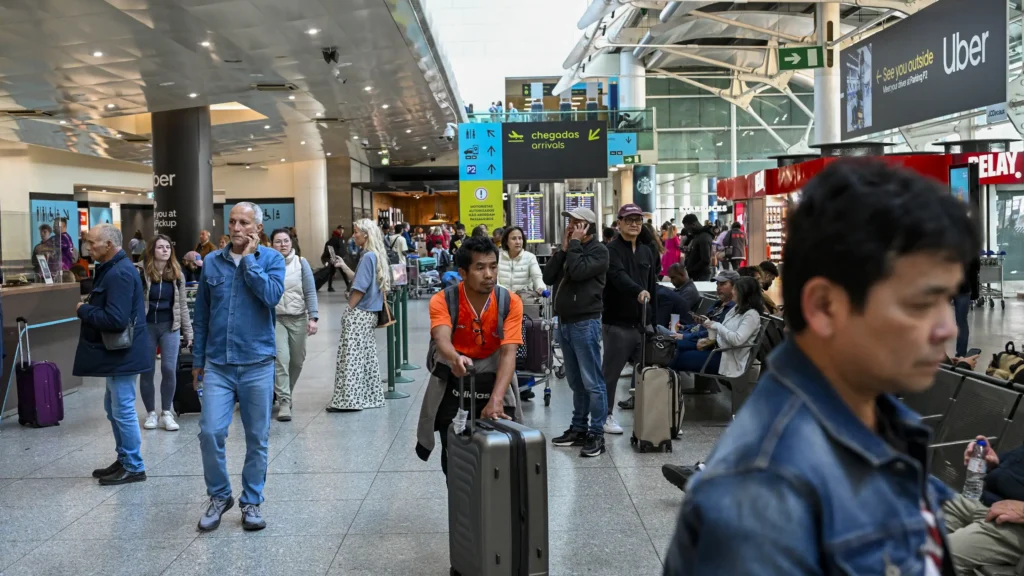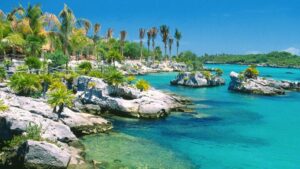How Trump’s New Tariffs Could Affect Your Next Vacation

Here’s how President Donald Trump’s recent policies will change your travel plans—for better and worse.

It’s been a hell of a week for economists and 401Ks. Following the rollout of President Trump’s “liberation day” tariffs on April 2, stock markets around the world have plunged thousands of points, folks are making proclamations about a “new world economic order,” and there’s been a lot of handwringing about the potential for a broader economic recession. Then, on April 9, Trump announced (on Truth Social) a 90-day pause on the most extreme tariffs (except for China), but kept 10 percent across the board for other countries. Shoppers and exchange traders will have to wait to see whether Trump is capable of negotiating new deals with every country on Earth or whether Americans will end up paying more for imported goods—but it’s a smart bet that the wild ride will continue.
If all the news has you feeling a bit anxious, maybe you’re thinking about booking a getaway, jetting off somewhere remote, where economic uncertainty is just a distant memory. Well, good luck with that. When the leader of the largest economy in the world starts a game of chicken with—well, everyone, there are few places anyone can hide from the fallout.
The good news is that tourism is a service industry, so it’s not directly impacted by tariffs, which target goods. But the businesses within the tourism industry rely on many of those same goods.
“Tariffs impact a service economy, such as the tourism industry, through increasing the cost of supplies and materials needed for producing services,” says Jukka Laitamaki, a professor of international hospitality and tourism at New York University. “Airfares could increase due to higher imported fuel and airplane spare part prices. Hotel prices could increase due to the higher cost of imported supplies and amenities. Restaurant prices could also increase if supplies and food items are imported.”
Not all destinations will be impacted equally, though. “Tariffs will have less impact in countries where services are mainly produced with domestic supplies and materials. The opposite is true for economies where services are dependent on imported goods,” Laitamaki says. This is especially true if other countries impose reciprocal tariffs. “Domestic U.S. travelers may not be impacted because the U.S. tourism industry relies mainly on domestic supplies.” But in foreign countries that do rely on imports, travelers (and locals) might pay more if those governments impose tariffs of their own. Laitamaki also notes you might see fewer new hotels and restaurants going up if construction materials like steel get caught up in a trade war.
Take Hawai‘i, one of the most popular getaways for American travelers. The island chain has come to rely heavily on imported food and goods over the course of decades. Frank Haas, former vice president of marketing for the Hawai‘i Tourism Authority and now a partner at Guild Consulting, says the state would be particularly affected.
“In 2023, about 10 percent of an average visitor’s daily spending here was on shopping,” Haas says. “While some of the merchandise visitors purchase is locally sourced, many souvenir items and luxury goods are imported, and they would be potentially impacted by tariffs. Similarly, much of Hawai‘i’s food is imported and the portion of food that is sourced from foreign (that is, non-U.S.) markets would be impacted.”
But even on the mainland, tourism prices will likely rise if tariffs push inflation up. And if more travelers decide to book domestic vacations, rather than face uncertainty abroad, that could raise prices even further.
“Following the COVID shutdown, there was a surge of ‘revenge travel’ that increased demand, which likely affected increased hotel pricing,” Haas says. On the other hand, if the economy tips into a recession or worried consumers are calling off trips, the drop in demand could drive down hotel prices.
Travelers hoping to book an international trip this summer may also want to watch the strength of the U.S. dollar.
“The major factor influencing costs for Americans traveling abroad is the strength of the dollar against other currencies,” Haas says. “At the end of 2024, for example, one U.S. dollar was worth 151 yen, compared to an exchange rate of 109 in 2019 (pre-COVID). That meant that the U.S. dollar appreciated by 38 percent and made American travel to Japan a relative bargain and Japanese travel to the U.S. relatively expensive.”
Before Trump’s liberation day went into effect, some economists forecasted tariffs would strengthen the dollar, since American consumers would buy fewer international goods in foreign currencies. But since last week, the dollar has actually fallen, as international investors have pulled back their investments in the U.S. That makes the exchange rate more painful for American travelers.
But don’t hold out hope for a stronger exchange rate. It might not make you many friends abroad.
“Residents of other countries may resent the increased value of the U.S. dollar,” says Jerry Agrusa, a professor at the University of Hawai‘i’s School of Travel Industry Management. “There are cases of local residents protesting international tourists at destinations because of too many tourists and the residents being ‘priced out of their own homes.’”
Locals might give you the stink eye if you show up waving around a strong dollar. They also might fight back, and not just with tariffs. “The other negative possibility that I can imagine is stricter immigration and visa restrictions resulting in ‘tit for tat’ responses by other countries.” All that could make it financially and logistically more difficult to travel.
Bet you could use that getaway right about now. A week without thinking about any of this? That’s priceless.
Source: Thrillist



